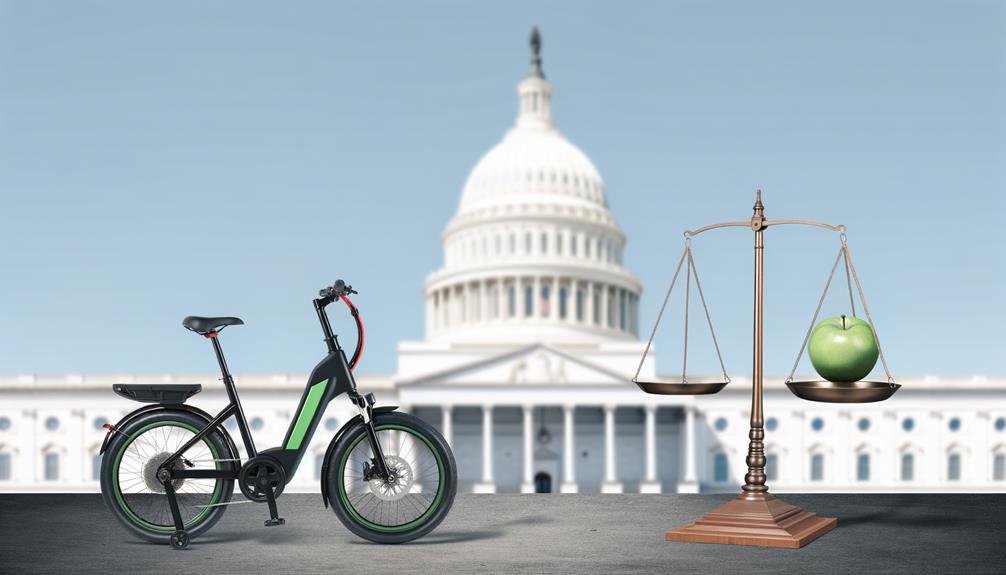Charles Miller is a veteran bike enthusiast with over 12 years of experience dealing with bikes as a mechanic. Despite immense love and expertise for...
Imagine riding smoothly along a sun-dappled bike path, the wind gently ruffling your hair as your electric bike hums quietly beneath you. We've all heard about the numerous benefits of electric bikes, from their environmental friendliness to the ease of commute they offer.
But a question that's been gaining traction amongst prospective e-bike owners is: 'Are there any taxes associated with these electric marvels?' It's a valid concern, considering the significant investment an e-bike represents.
We're here to unmask the truth, to see just how Uncle Sam is involved when you decide to go green on two wheels. So, buckle up, because it's going to be an enlightening ride.
Key Takeaways
- The proposed federal tax credit for electric bicycles aims to promote sustainable and healthy transportation.
- The tax credit offers up to 30% of the cost of the eBike, capped at $1,500.
- To qualify for the tax credit, the eBike must be priced under $8,000 and belong to class 1, 2, or 3.
- The E-BIKE Act, which includes the tax credit, is currently under review by the House of Representatives and has the potential to make eBikes more affordable.
Understanding the E-Bike Tax Credit
Diving into the details, the E-BIKE Act proposes a significant tax credit aimed at promoting the use of electric bicycles, or eBikes, as a sustainable and healthy mode of transportation in the United States. This federal tax credit, known as the Electric Bicycle Incentive Kickstart, offers a considerable incentive for e-bike purchases: up to 30% of the cost, capped at $1,500.
To qualify, eBikes must be new, purchased inside the U.S., and have an electric motor under 750 watts. They also need to belong to class 1, 2, or 3. We believe this eBike Tax Credit can effectively encourage the adoption of eBikes, which we know can ease traffic congestion, lower carbon emissions, and promote active lifestyles.
However, it's important to note that this proposed legislation needs to pass in the House, then the Senate, and receive the President's approval to become law. As we advocate for the Act, we're not just promoting tax credits for electric bikes, we're fostering a sense of belonging in a community that values sustainability and health. Together, we can make a difference.
Qualifications for E-Bike Tax Credit
Let's now turn our attention to the qualifications for the e-bike tax credit.
It's important to understand the eligibility criteria, how the tax credit amount is determined, and the process for claiming this credit.
Eligibility Criteria for Credit
Navigating the path to receiving a tax credit for your e-bike purchase involves understanding a few key eligibility criteria.
Under the E-Bike Act, federal e-bike tax credits are available for new e-bikes that meet specific classifications. These electric bikes must be two-wheeled vehicles equipped with an electric motor of fewer than 750 watts. They must be classified as either class 1, 2, or 3 electric bicycles.
Additionally, the e-bike should have pedals and a seat for the rider. This tax credit can cover up to 30% of the cost of buying an e-bike, with a $1,500 limit.
Remember, individuals can avail this credit once every three years.
Stay informed and make your e-bike purchase more affordable.
Understanding Tax Credit Amount
To fully appreciate the potential savings, it's essential to understand the qualifications for the e-bike tax credit outlined in the E-BIKE Act.
This proposed federal legislation defines a qualified electric bicycle as a two-wheeled vehicle with an electric motor of fewer than 750 watts.
If passed, the Electric Bike Tax Credit could cover up to 30% of the new electric bike's cost, with a cap at $1,500.
This eBike incentive doubles for joint tax returns where two family members buy electric bicycles.
The E-BIKE Act is still a bill requiring approval from the House, Senate, and the President to become law.
Let's support this legislation as it offers e-bike rebates, making eBikes more affordable and promotes active and healthy lifestyles.
Claiming E-Bike Tax Credit
If you're considering purchasing an e-bike, it's crucial to understand the qualifications required to claim the E-Bike Tax Credit proposed by the E-BIKE Act. This act is currently under review by the House of Representatives in the United States.
The qualifications include:
- The eBike must be priced at less than $8,000.
- For single filers, an income cap of $150,000 is set.
- Joint filers with combined income below $300,000 are eligible.
- Both traditional electric bikes and e-bike conversion kits are covered.
Amount of E-Bike Tax Credit
Under the proposed E-BIKE Act, individuals stand to receive a generous tax credit of up to 30% on the purchase of an electric bike, capped at $1,500 or 30% of the total cost, whichever is less. This Act is a Kickstart for the Environment and an Inflation Reduction Act in one, making eBike ownership more accessible.
This amount of e-bike tax credit is a significant incentive. Moreover, the tax credit would be doubled for joint tax returns where two family members purchased eBikes. This credit can be claimed once every three years.
We've prepared a table to make these details crystal clear:
| Details | Amount |
|---|---|
| Maximum Tax Credit | $1,500 or 30% of cost |
| Frequency | Once every 3 years |
| Income Requirement | $75,000 (individual) or $150,000 (joint) |
| Applies to | New eBikes & conversion kits |
| Current Status | Not yet passed |
Status of the E-Bike Act

We're now turning our attention to the current status of the E-Bike Act.
We'll examine its legislative journey thus far, explore the potential tax implications for potential eBike buyers, and consider the possible future impacts of the act.
In doing so, we'll provide a comprehensive overview of this significant piece of legislation.
Understanding the E-Bike Act
While the E-BIKE Act, offering attractive financial incentives for eBike purchasers, hasn't yet been passed, it's garnered significant support from twenty co-sponsors in Congress and, if enacted, could revolutionize the electric bicycle industry in the U.S.
Spearheaded by Jimmy Panetta (D-CA) and Congressional Bike Caucus founder, Earl Blumenauer, the Act proposes a tax credit aiming to make electric bikes more affordable. Here's what you need to know:
- It covers 30% of an eBike's cost, up to $1,500.
- The eBike must have an electric motor of fewer than 750 watts.
- e-Bike batteries must meet specific eligibility criteria.
- The tax credit doubles for joint tax returns where two eBikes are purchased.
This initiative invites us all to join in building a greener, healthier future.
Tax Implications for Buyers
If the E-BIKE Act becomes law, it could significantly impact your tax situation, especially if you're considering buying an eBike.
This legislation, re-introduced by Adam Schiff and Mike Thompson, proposes a tax credit of up to 30% on the purchase price of electric bikes, with a cap at $1,500. The tax implications for buyers could be significant, potentially making eBikes more affordable.
The Senate Bill is yet to be passed, but it has robust support in Congress. It's designed to encourage eBike use and address climate change.
But remember, the tax credit is only applicable for specific eBike types and for those earning $75,000 or less annually.
Now's the time to belong to the eBike community!
E-Bike Act's Future Impact
Peering into the future of the E-Bike Act, it's clear that its potential passage could revolutionize the eBike industry and significantly alter our transportation landscape. The Environment (E-BIKE) Act is poised to change the game by incentivizing Americans to use e-bikes.
- The E-Bike Act would make e-bikes more affordable, as it offers a tax credit that reduces the cost of purchasing an e-bike.
- It could shift our transportation from electric cars to e-bikes, leading to lower carbon emissions.
- The Act would promote healthier lifestyles as e-bikes encourage physical activity.
- Lastly, it could ease traffic congestion, as e-bikes take up less road space than electric vehicles.
Supporting the E-Bike Tax Credit

In advocating for the E-BIKE Act, we recognize the significant benefits it presents for potential eBike owners, such as substantial pre-tax credits and rebates, along with the possibility of these benefits extending to eBike conversion kits in certain areas. This Act, also known as the Electric Bicycle Incentive Kickstart for the Environment Act, is a powerful tool to make electric, environmentally friendly transportation accessible to more people.
To clarify, an electric bike would qualify for the tax credit if it has an electric motor of fewer than 750 watts. We believe this incentive can effectively reduce carbon emissions by encouraging people to swap car trips for eBike rides. Supporting the e-bike tax credit isn't only about financial benefits but also about promoting a sustainable future.
As of now, the E-BIKE Act is a Bill with twenty co-sponsors in Congress. We're hopeful for its passing, as it would provide a much-needed kickstart incentive for the eBike industry. We encourage all to rally behind this Act, for the benefits it presents for eBike owners and the environment alike.
State Regulations on E-Bike Incentives
While we eagerly anticipate the potential nationwide impact of the E-BIKE Act, it's crucial to also examine the role individual states, like Hawaii, Connecticut, Colorado, and Massachusetts, are playing in promoting e-bike usage through their unique incentives and rebates.
Let's delve into the initiatives of these states:
- Hawaii's Kickstart Incentive: This new initiative provides a 20% rebate to e-bike purchasers, encouraging healthier, environmentally friendly transportation options.
- Connecticut's Environment Act 77: This Act showcases a bold commitment to reducing carbon emissions by offering significant e-bike rebates.
- Colorado's E-Bike Act: This Act offers attractive tax credits to e-bike buyers, stimulating the e-bike market.
- Massachusetts' E-Bike Program: This program provides grants to local businesses and organizations to promote e-bike usage.
These state-specific incentives are setting remarkable precedents for how the E-BIKE Act would apply if it becomes law. As we move towards a more sustainable future, it's heartening to see such strong support for e-bikes at both the state and federal levels.
These initiatives not only promote green transportation but also foster a sense of belonging among e-bike users nationwide.
Frequently Asked Questions
Is There a Tax Deduction for Buying an Electric Bike?
We're considering the tax deduction eligibility for electric bike purchases. The potential tax benefits, financing options, state-based incentives, sustainability rebates, and ownership costs make it an appealing investment. Let's explore this further.
What Is the E-Bike Tax Act?
We're unraveling the E-Bike Act's knot. It's proposed legislation offering tax benefits to e-bike buyers, influencing consumer behavior, and potentially reducing carbon emissions. However, its passage remains uncertain, stirring controversy about its environmental and consumer implications.
What Is the Ohio Ebike Program?
We're unsure about the Ohio Ebike Program as it wasn't addressed in our discussion. We've been focusing on the E-BIKE Act and its potential tax benefits for electric bike purchases at the federal level.
What Is the Federal Law for Ebikes?
We're navigating through federal regulations for eBikes. They define eBike classifications, set speed limitations, outline riding permissions and enforce safety measures. Changes in legislation aim to improve eBike accessibility. We're all part of this eBike revolution.
Conclusion
In conclusion, while there's currently no tax on eBikes, the proposed E-BIKE Act could significantly shift the landscape. This potential tax credit, offering up to $1,500 or 30% of the eBike's cost, is a remarkable incentive. Isn't it high time we embrace such green initiatives?
However, the bill's future remains uncertain. We urge you to stay tuned for updates and consider supporting measures that promote sustainable transportation. Remember, every individual effort counts towards a greener future.

Charles Miller is a veteran bike enthusiast with over 12 years of experience dealing with bikes as a mechanic. Despite immense love and expertise for his Tacoma, he rides his Trek Ebike more. Anytime you meet him, you’ll either hear him talking about Bikes, or writing about all things bikes and cars on this blog.
More Posts


